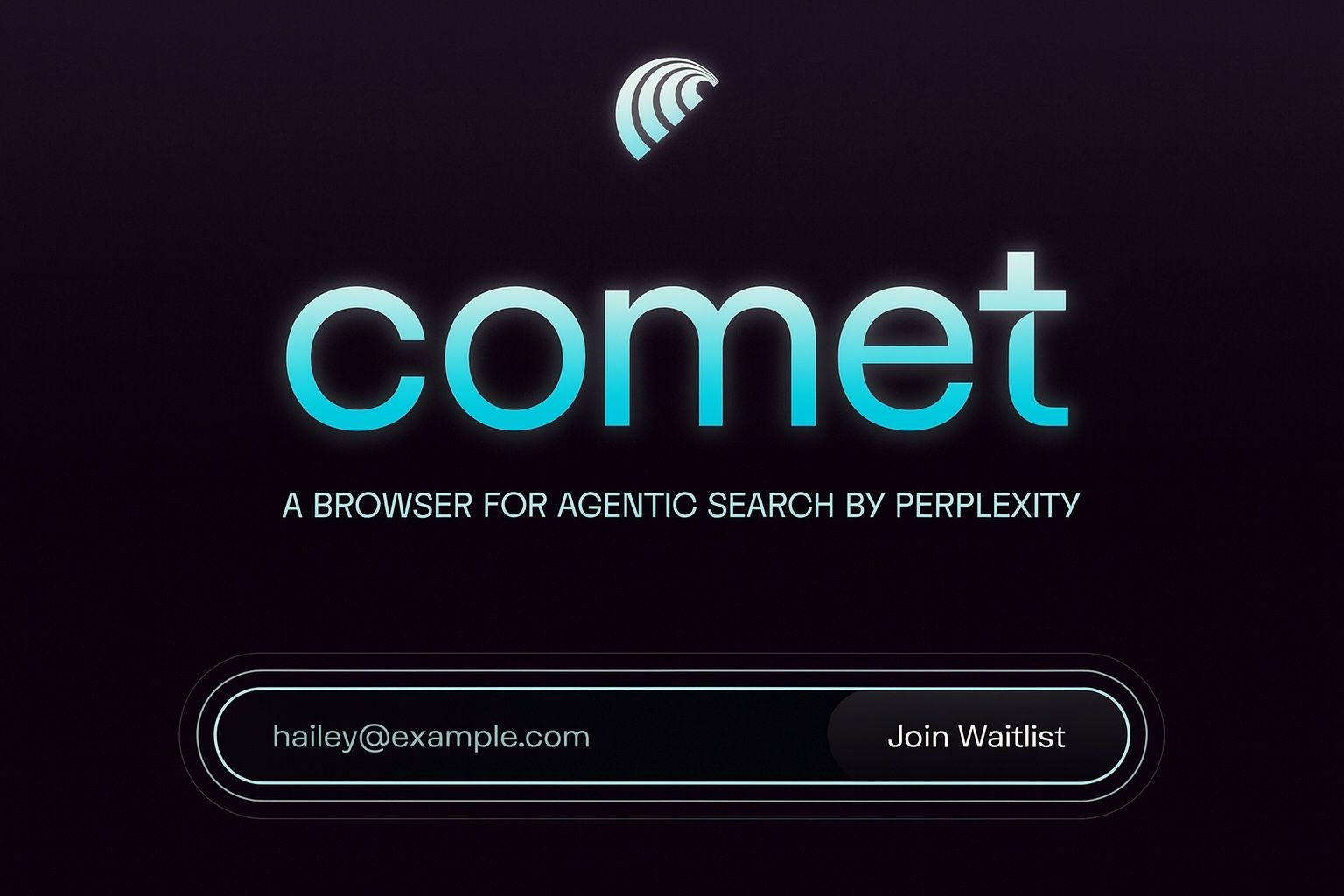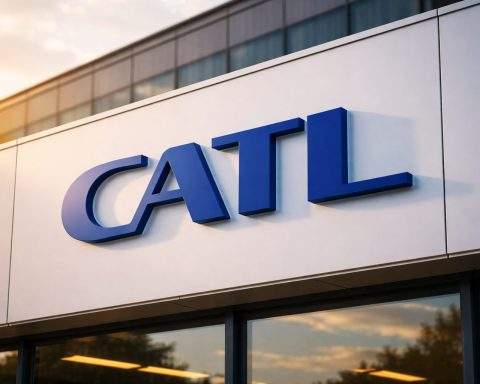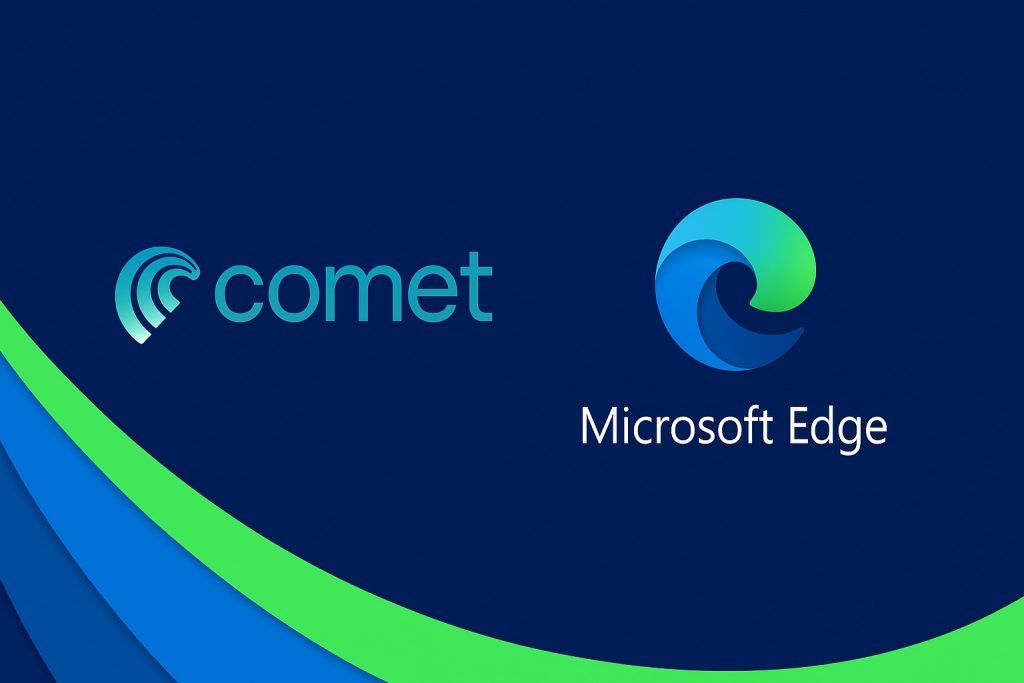- $200 AI Browser Now Free: Perplexity AI has opened its new Comet browser to everyone at no cost, after initially offering it only via a $200/month “Max” subscriptionbusinessinsider.comcomputerworld.com. The move, announced in early October 2025, aims to make Comet accessible “to everyone in the world, forever,” according to CEO Aravind Srinivas1 .
- Fighting “AI Slop” & Low-Quality Content: Srinivas says the free launch is a direct response to the flood of low-quality, AI-generated web content (what he calls “slop”). Comet’s mission is to help users avoid clickbait and focus on high-quality informationbusinessinsider.combusinessinsider.com. “We want to build a better internet, and that needs to be accessible to everybody,” the CEO told Insider1 .
- Built-In AI Assistant: Comet’s standout feature is an AI sidekick that lives in the browser. It can summarize webpages, answer questions about what you’re reading, navigate links, and even perform multi-step tasks on your behalftechcrunch.comtechcrunch.com. For example, the assistant can research a topic, plan travel itineraries, or draft emails while you browse – essentially turning web surfing into a conversation with an AI.
- Freemium Model & Premium Content: The core AI features are free (with some usage rate limitsbusinessinsider.com), but Perplexity is rolling out Comet Plus, a $5/month add-on that gives users and their AI assistants access to paywalled journalism from major publishers like CNN, The Washington Post, Fortune, and Le Mondebusinessinsider.comperplexity.ai. Perplexity says 80% of that subscription revenue will go to partner publishers as part of an effort to “deliver premium journalism” in the age of AI2 .
- Competing with Chrome & Co.: Comet directly targets Google Chrome’s dominance. A Perplexity press release even called out “long-promised AI browsers from legacy companies” that have yet to materializebusinessinsider.com. Chrome has over 3 billion users globally, while Comet’s waitlist reached “millions” during its limited releasebusinessinsider.com. Comet also joins a wave of AI-centric browsers challenging incumbents, from Brave’s Leo assistant to The Browser Company’s new AI browser Dia, and upcoming offerings from OpenAItechcrunch.com3 .
- User Experience – Powerful but Poses Questions: Early reviewers report Comet can feel like “a browser with a built-in personal researcher.” One tester had Comet scan Gmail for upcoming events and automatically fill their calendar, compile a grocery list from a recipe and pre-fill an online cart, and even generate charts from data in an academic papertechradar.comtechradar.com. These anecdotes show Comet turning browsing from passive reading into active doing. However, this deep AI integration means the system sees a lot of your browsing and personal data, raising privacy concernstechradar.com. Experts warn users must trust the AI’s judgment and data handling if they’re to fully embrace this new way of browsingtechradar.com4 .
- Security Warnings: Comet’s “agentic” AI abilities come with new risks. In one security test, a single malicious link silently prompted Comet’s assistant to exfiltrate a user’s emails and calendar data – an attack dubbed “CometJacking”thehackernews.com. Researchers from Brave and LayerX found that because Comet feeds page content directly to its AI without adequate filtering, attackers can embed hidden instructions on webpages that the AI will execute as if they were user commandswindowscentral.comwindowscentral.com. Perplexity downplayed the findings as having “no security impact,” but analysts say AI-native browsers need “security-by-design” to prevent prompt injection and other novel exploitsthehackernews.com5 .
Comet’s Vision: An AI Browser to Fix a “Broken” Internet
Perplexity introduced Comet with grand ambitions. “The internet is broken,” the company declared in its launch blog post, arguing that traditional web browsing traps users in ad-driven click funnels and superficial contentperplexity.ai. Comet is positioned as the antidote: an AI-enhanced browser that encourages deeper curiosity by making it effortless to ask questions and dig for knowledge. According to the Perplexity team, early Comet users showed a 6–18x increase in the number of questions they asked online, indicating a surge in curiosity-fueled exploration6 .
Central to Comet’s appeal is the Comet Assistant – a GPT-4 powered AI agent that “browses the internet with you” in a sidebarperplexity.ai. Unlike using ChatGPT or Bing Chat in a separate window, Comet’s assistant is omnipresent as you navigate. Open a new tab, and a fresh assistant instance is ready to helpperplexity.ai. Visit a news article, and it can summarize key points or provide context. Land on a product page, and it can compare prices elsewhere. If you’re drafting an email or document in the browser, the assistant can offer writing tips or even generate text on command. In Perplexity’s vision, every new browser tab is the start of a conversation – a chance to ask something and get instant support7 .
To enable this, Comet comes with a suite of integrated AI “tools” accessible to all users. These include Discover, a personalized news feed with AI-curated content (akin to OpenAI’s “Pulse”), Spaces for organizing research or projects, Shopping for finding deals, Travel for trip planning, Finance for budgeting and tracking investments, and Sports for real-time scores and updatestechcrunch.com. In essence, Comet bundles what would normally require separate apps or websites into one AI-assisted browser interface. And thanks to its Chromium foundation, the basic look and speed of Comet will feel familiar to Chrome or Edge userstechcrunch.comtechradar.com – reducing the learning curve even as it introduces futuristic capabilities.
Background Assistants push the concept further. Unveiled for Max subscribers, this feature lets you deploy multiple AI agents to work in parallel on different tasks, all managed from a “mission control” dashboardtechcrunch.comtechcrunch.com. For example, you could instruct one AI agent to book flights for an upcoming trip, another to draft a report using web research, and a third to sift through your emails for important updates – all at once, in the background. “It’s like a team of assistants working for you,” a Perplexity spokesperson explainedtechcrunch.com. The agents update their progress in real-time, and you can step in to review or finalize actions (e.g. confirm an email draft or a shopping cart) when they’re donetechcrunch.com. This concept of autonomous multi-agent workflows is cutting-edge, and Perplexity is betting it will meaningfully boost productivity for power users. In fact, Srinivas has suggested that Comet’s automation could help companies “boost productivity so that they don’t have to hire more people” for certain rolesm.economictimes.com – a bold claim reflecting the browser’s workplace potential.
Privacy Trade-offs and the New Monetization Model
Comet’s powerful AI functions come at a cost: to assist you, it needs access to your data. During the browser’s development, Perplexity’s CEO was candid that one motive for building Comet was to “get data even outside the app to better understand you”malwarebytes.com. The standalone Perplexity AI app (a Q&A search service) only saw the questions users typed into it. But a browser sees everything you do online. As Srinivas explained on a podcast, knowing “what you’re buying… which hotels you’re going to… what you’re spending time browsing” can help build a much richer user profilemalwarebytes.com. That profile, in turn, could allow highly targeted advertising delivered via Comet’s Discover feedmalwarebytes.com. In other words, Perplexity has a financial incentive to collect extensive behavioral data from Comet users – a point not lost on privacy advocates.
Unsurprisingly, this raised alarm bells. “What privacy?” quipped one Malwarebytes analysis, noting that “the word ‘privacy’ didn’t come up once” in Srinivas’s enthusiastic description of Comet’s data collection plansmalwarebytes.com. The company portrays Comet as “privacy-focused” – it even floated the idea of a “Strict Mode” that would process sensitive tasks (like reading your emails or calendar) locally on your devicereddit.comreddit.com. But early users struggled to find any such strict local mode in settingsreddit.com, suggesting it may be more promise than reality at launch. What is clear is that by logging into Comet with your Perplexity account (required to use the AI features), your browsing activity and AI queries are tied to your identityreddit.comreddit.com. Perplexity’s general privacy policy (last updated February 2025) allows it to collect personal info, usage data (like device info and IP), and even data from third-party accounts you connect (e.g. Google)reddit.comreddit.com. All that can be associated with your profile – a goldmine for personalization, and potentially, advertising.
Srinivas argues that this data-driven approach will enable “a better user profile” and thus a more genuinely helpful AI assistantmalwarebytes.commalwarebytes.com. But skeptics note the tension in Perplexity’s narrative: on one hand, Comet decries the current web’s ad-driven clickbait culture; on the other hand, Perplexity itself is building an ad targeting engine within a walled-garden AI browser. The difference, the company would say, is quality over quantity. Instead of inundating users with random ads and low-value content, Comet wants to curate information from trusted sources and present it alongside relevant, premium ads or sponsored answers. This is where Comet Plus comes in.
Comet Plus represents a significant business model shift. For a $5 monthly fee (which is included at no extra charge for existing Perplexity Pro and Max subscriberstechcrunch.com), users get access to a roster of top publishers that have joined as launch partnersperplexity.aiperplexity.ai. The list reads like a who’s who of reputable media: CNN; Condé Nast’s portfolio (The New Yorker, Wired, Vogue, etc.); Fortune; Le Figaro; Le Monde; The Los Angeles Times; The Washington Post, and moreperplexity.aiperplexity.ai. Content from these outlets can be accessed directly through Comet – presumably without hitting paywalls – and the Comet AI can draw on their articles when answering user questions. Perplexity will then compensate publishers based on how often their content is viewed or used by the AI, shifting away from the pageview-driven model that online media has relied onperplexity.aiperplexity.ai. The company says publishers get 80% of Comet Plus revenue, keeping them vested in the ecosystembusinessinsider.com. By aligning incentives this way, Perplexity claims it is “championing real journalism” rather than replacing itperplexity.ai8 .
This strategy addresses a major criticism of generative AI search tools – that they scrape content from news sites without rewarding the creators. If Comet’s approach gains traction, it could set a precedent for how AI-powered search and browsing platforms strike deals with content providers. Industry watchers have called it a “$5 fix for an AI content crisis”, suggesting it may be a more ethical approach to AI answerswindowscentral.comwindowscentral.com. Still, the jury is out on whether users will pay for yet another content bundle, and whether the provided selection of outlets satisfies their information needs. It’s a bold attempt to reconcile AI convenience with publisher sustainability.
Importantly, Perplexity isn’t relying solely on subscriptions. The company’s staggering $20+ billion valuation and investor backing indicate it’s playing a long gamebusinessinsider.com. By making the browser free, Perplexity hopes to quickly grow its user base – “capture people’s browsing time” is how one TechRadar writer put ittechradar.com. The more users and data Comet has, the smarter its AI can get and the more attractive its advertising or partnership opportunities become. In that sense, Comet’s business model may evolve into a hybrid of premium subscription (for power users and enterprise clients) and contextual advertising or affiliate revenue (for the masses on the free tier). Perplexity has already dabbled in partnerships outside of news: in a creative promotion, it teamed up with Chess.com to launch a $200,000 online chess tournament called the Comet Open, open exclusively to users browsing via Cometchess.comchess.com. For Comet users, Chess.com even unlocked a month of premium features as a perkchess.com. Such partnerships indicate Perplexity is aggressively seeding Comet in niche communities – in this case, targeting the chess world’s millions of curious, tech-savvy players – to drive adoption.
How Comet Stacks Up Against Chrome, Brave, Arc, and Firefox
The web browser arena has long been dominated by a few giants, but AI is shaking things up. Here’s how Comet compares to the major players and the new wave of AI-powered rivals:
- Google Chrome: Chrome remains the 800-pound gorilla with over 3 billion users, immense engineering resources, and deep integration with Google’s services. However, Chrome has been slow to add AI features. Google’s strategy so far has been to incorporate generative AI into search results (via its Search Generative Experience) and tools like Google Bard, rather than fundamentally changing the Chrome interface. Only in fall 2025 did Google begin testing built-in AI features in Chrome (like an “overview” that summarizes pages)businessinsider.com. Perplexity seizes on this contrast: its press materials pointedly refer to “legacy” browsers resting on their laurelsbusinessinsider.com. Comet aims to out-innovate Chrome by baking AI into every corner of the experience, something Google is only tiptoeing toward. Distribution, though, is Chrome’s trump card. Perplexity acknowledges it faces a steep climb to convince users to ditch a familiar tool. As Srinivas noted, Chrome’s user base dwarfs Comet’s early adoptersbusinessinsider.com. In fact, Perplexity made headlines by (half-seriously) offering to buy Chrome for $34.5 billion if antitrust regulators forced Google to sell itbusinessinsider.combusinessinsider.com. That didn’t happen – the government let Google keep Chrome – and Srinivas insists he’s “not disappointed” because “Comet is not just another browser meant to take market share away from Chrome”businessinsider.com. Instead, he frames Comet as a different paradigm: an “AI assistant that happens to do browsing,” as opposed to Chrome’s classic browser that might add an assistant. In sum, Chrome is safe for now, but if users decide they want an AI-centric workflow, Google may have to catch up or risk losing its stranglehold on how people access the web9 .
- Brave: Born in 2016 as a privacy-focused alternative to Chrome, Brave is now positioning itself as an AI-enhanced browser too – but with a very different philosophy from Comet. Brave integrates an AI assistant called Leo, which the company is developing with an emphasis on on-device processing and user privacywindowscentral.com. In fact, Brave’s approach to AI appears partly driven by security caution: its engineers have been studying Comet’s missteps to ensure Leo can “browse the web on your behalf” without the same vulnerabilitieswindowscentral.comwindowscentral.com. Brave already offers a summarizer for webpages and search results using local machine learning models, meaning the raw page data and queries don’t always leave the user’s machineresearch.aimultiple.comresearch.aimultiple.com. According to one independent benchmark, Brave’s Leo performed reliably on core tasks like webpage summarization and Q&A – on par with Comet’s capabilities – all “without subscription requirements” or cloud data slurpingresearch.aimultiple.comresearch.aimultiple.com. That same test praised Brave as providing “comprehensive functionality immediately” to users for freeresearch.aimultiple.com. Where Brave trails Comet is in ambition: until now, Brave’s AI features have been more limited (e.g. right-click to summarize text, or an opt-in chatbot in a sidebar). But Brave announced it is working on agentic browsing too, acknowledging that “this kind of agentic browsing is incredibly powerful, but it also presents significant security and privacy challenges.”windowscentral.com. In August 2025, Brave’s security team published findings on Comet’s flaws and promptly added protective measures to Leo before those features fully launchwindowscentral.comwindowscentral.com. In the competitive landscape, Brave is likely to appeal to users who want AI convenience with maximum privacy – a counterpoint to Comet’s cloud-heavy approach. With roughly 50 million monthly users, Brave is smaller than Chrome but has a loyal following. If its Leo assistant can match Comet’s usefulness without the privacy trade-offs, Brave could emerge as a strong alternative for the tech-savvy cautious crowd.
- Arc (The Browser Company) / “Dia”: Arc, an innovative browser from The Browser Company, garnered buzz in 2022–2023 for its fresh take on the browser interface (a sleek sidebar, creative tab management, etc.). Yet Arc remained a niche product, and its makers concluded it “never hit scale” due to a steep learning curvetechcrunch.com. In 2024, seeing the writing on the wall with AI, The Browser Company hit reset. They stopped major development on Arc and went all-in on building an AI-first browser codenamed “Dia”techcrunch.com. Launched in beta in mid-2025, Dia is essentially Arc’s spiritual successor with GPT-4 deeply integratedtechcrunch.com. It’s built on Chromium too, so baseline performance is similar to Comet’s. The marquee feature of Dia is a conversational chatbot that doubles as your address bar and command linetechcrunch.com. Instead of typing a URL or Google query, you can ask Dia’s bot to find information or perform actions. It can search the web, summarize PDFs or articles you have open, answer questions about all your open tabs, and even generate content based on those tabstechcrunch.com. The Browser Company envisions users “talking” to their browser to get things done – much like Perplexity does, though Dia’s interface is perhaps even more chat-centric. Notably, Dia allows users to customize the AI’s personality and style by simply chatting with it (you can set tone or coding preferences through conversation)techcrunch.com. It also introduced “Skills” – essentially mini AI scripts to automate tasks, like a voice-controlled macro that can reformat a page for better reading, etc.techcrunch.com. While Dia and Comet share a similar ethos (integrated AI agent for everything), Dia is still in invite-only beta and thus far less tested by the public. Perplexity got a head start by releasing Comet earlier and now free to all. But The Browser Company’s pedigree and Arc’s fanbase mean Dia is a competitor to watch. If nothing else, its existence validates the trend that browsers themselves are becoming “AI assistants”, not just portals to AI websites. Both Comet and Dia will be fighting to prove that their AI-augmented experience is compelling enough to pull users away from Chrome or Safari.
- Firefox: Mozilla’s Firefox, one of the last independent, non-Chromium browsers, has taken a cautious but notable path toward AI. Mozilla has publicly emphasized “privacy-first AI features” that align with its ethosblog.mozilla.org. For instance, recent Firefox versions added an optional AI helper sidebar that can connect to services like ChatGPT or Claude – but only at the user’s explicit requestsupport.mozilla.org. In 2025, Firefox experimented with on-device AI for things like automatic alt-text descriptions for images, translation, and grouping tabs, explicitly assuring users that “all powered on-device to keep your data private”blog.mozilla.org. In fact, Mozilla has integrated some AI in ways that don’t contact the cloud at all, such as local text classification to suggest tab groups (this caused a stir when users noticed higher CPU usage due to an “inference engine” running locally)tomshardware.com. Interestingly, Mozilla even tested Perplexity’s search engine as a built-in option in Firefox’s search bar in 20259to5mac.com. This shows Mozilla’s willingness to collaborate on AI if it benefits users, even if it means partnering with a potential rival like Perplexity. Unlike Comet, Firefox isn’t attempting an AI assistant that can control the browser (at least not yet). Instead, it’s focusing on enhancing the user’s own awareness and productivity (e.g. summarizing a page on request, or letting the user bring up an AI chat in a sidebar). Firefox’s competitive advantage remains its robust privacy protections and the trust it has built over decades. Some users will prefer a Firefox with light AI augmentation that asks for your data, versus a Comet that defaults to grabbing your data for convenience. That said, Firefox’s market share is small (hovering around 3%–5% of desktop usage) and it lacks the resources of big tech. Mozilla’s challenge will be staying relevant as browsing increasingly intertwines with AI. They’ve signaled interest – for example, by creating Mozilla.ai, a startup focusing on open-source, trustworthy AI – so Firefox may gradually become smarter in privacy-preserving ways. For now, it’s more of a partial integration approach, standing in contrast to Comet’s all-in strategy.
In summary, Comet is spearheading a new category of “AI-native browsers.” Its closest peers are not Firefox or even Chrome in their current forms, but rather Edge’s forthcoming Copilot mode, Opera’s AI experiments, Brave’s Leo, and Arc’s Dia. Microsoft’s Edge, for instance, has added an “AI copilot” sidebar (powered by Bing Chat) and as of July 2025 is testing a “Copilot Mode” that can see all open tabs and provide context-aware help across themwindowscentral.comwindowscentral.com. Opera has integrated ChatGPT (branded as Aria) and even launched a premium AI browser offshoot called Opera Neon for $20/monthwindowscentral.com. Each of these efforts has a different twist – Opera is leaning into AI for visual design and media, Microsoft is leveraging Windows/Office tie-ins – but all recognize the same shift: users increasingly expect the browser to do more than load pages. In that race, Perplexity’s Comet has grabbed attention by being early and by going big (and free). Now it must convince users that an AI co-pilot in the browser is not just a gimmick, but a better way to experience the internet.
Hype, Skepticism, and Expert Reactions
Comet’s debut has drawn both enthusiastic reactions and critical scrutiny from experts across tech and media. Here are some of the voices and viewpoints shaping the conversation around this new browser:
- User Enthusiasm & Curiosity: The initial demand for Comet was enormous – Perplexity says millions of people joined the waitlist after its limited July launch, far outpacing the invite rolloutperplexity.aiperplexity.ai. This pent-up interest made Comet something of a viral sensation in AI circles, billed as “the most sought-after AI product of the year” by its makersperplexity.ai. When the free-for-all release hit on October 2, social media was abuzz with people eager to test it. Many early users marveled at the concept of a browser that talks back and gets stuff done. “I can’t believe it’s free now,” wrote one TechRadar reviewer after 48 hours with Comet, noting how tasks that used to require juggling apps could be handled in-line by the AItechradar.comtechradar.com. The ability to just ask your browser to, say, book a meeting or summarize a lengthy PDF – and watch it execute live – has been described as a “glimpse of the future” of the webtechradar.comtechradar.com. Some compare it to having a junior assistant or an intern sitting in the browser, which is both exciting and a bit disconcerting. Overall, the public sentiment skews positive on the novelty and productivity potential, with a healthy dose of “Is this real life?” amazement at what AI can do. Of course, as the honeymoon wears off, users are also likely to identify pain points and decide if Comet truly makes their lives easier day-to-day or if it’s more of a high-tech toy.
- Productivity Boost or Just Hype?: CEO Aravind Srinivas is unsurprisingly Comet’s biggest champion. At the launch event in San Francisco, he framed Comet as almost inevitable in the evolution of work. By handling rote digital tasks, Comet can “help people focus on meaningful work” and cut through the noise of the modern webbusinessinsider.combusinessinsider.com. He even suggested companies might be able to slow down hiring because Comet boosts individual output so muchm.economictimes.com. This echoes a broader narrative in tech that AI copilots can augment knowledge workers dramatically. Some industry analysts agree that AI browsers could change workflows. “An AI browser blurs the line between searching and doing,” said one commentator, “it turns every user into a power user by default.” There’s a sense that if Comet’s agents work as advertised, they could siphon time away from traditional search engines (bad news for Google’s ad business) and productivity apps (if Comet automates tasks one might otherwise delegate or do manually). However, skeptics caution that tangible productivity gains are unproven. TechCrunch noted that without clear, reliable improvements, many people will hesitate to leave their trusted browserstechcrunch.com. There is also a learning curve: users must get comfortable delegating to AI and phrasing requests effectively. Some early adopters reported moments of “assistant fatigue”, where the AI would misinterpret an instruction or require correction, interrupting their flow. As with any new tech, it may take time – and several iterations – to validate the grand productivity claims.
- Security Experts Sound Alarm: Perhaps the loudest critical reaction has come from the security community. The “CometJacking” vulnerability disclosed by LayerX and the “Scamlexity” tests by Guardio (and Brave) have raised red flags about the risks of an agentic browserthehackernews.comwindowscentral.com. “AI browsers are the next enterprise battleground,” warned Or Eshed, CEO of LayerX. “When an attacker can direct your assistant with a link, the browser becomes a command-and-control point inside the company perimeter.”thehackernews.com His concern is that businesses might eagerly adopt AI-enabled browsers like Comet to boost productivity, but inadvertently introduce a weak link that hackers can exploit. Michelle Levy, head of security research at LayerX, put it starkly: “CometJacking shows how a single, weaponized URL can quietly flip an AI browser from a trusted co-pilot to an insider threat. …This isn’t just about stealing data; it’s about hijacking the agent that already has the keys.”thehackernews.com That vivid metaphor underscores that an AI with deep permissions (email, calendar, cloud drives) can do damage quickly if misled. Brave’s team, too, emphasized how prompt injection in a browser is more dangerous than conventional phishing because the AI acts with such confidence. “Unlike traditional web vulns that affect one site… this attack is browser-wide. Malicious instructions could be hidden in a Reddit comment [or any page]. The attack is indirect and the user never gets a chance to spot it, because their trusted AI guide is executing everything,” Brave’s researchers wrotewindowscentral.comwindowscentral.com. Perplexity has patched some issues and argues that users still must confirm certain actions (Comet won’t automatically send your credit card info to a random site without asking, for instance). Nonetheless, security pros are urging caution, especially for enterprise deployments. Their advice: treat AI agents as at-risk principals, limit what accounts and data you connect to them, and employ browser security tools that can detect when an AI might be navigating somewhere it shouldn’t. This wave of concern is not unique to Comet – any AI with browsing and execution power (including OpenAI’s upcoming browser or Edge’s Copilot) will face similar scrutiny. It’s a new frontier for cybersecurity, and Comet is simply the first to hit the tripwires, thereby “presaging the challenges ahead,” as one analyst put it.
- Privacy Advocates & Critics: Privacy-focused voices have a nuanced take on Comet. On one hand, they applaud Perplexity’s willingness to experiment with new web monetization that isn’t purely surveillance-ad based. The Comet Plus model of paying publishers is seen as a positive step “to save online journalism”, even if, as a TechRadar opinion piece noted, “it’s still an AI middleman” at the end of the daytechradar.comtechradar.com. On the other hand, there’s significant worry about how much user data Comet aims to accumulate. Danny O’Brien of the Electronic Frontier Foundation mused that we’re “trading one tracker for another”: moving from Google’s Chrome (which tracks for ads) to Comet (which tracks for a personalized AI experience and its own ads). The difference in philosophy is that Google mostly tracks what you explicitly search or click, whereas Comet’s vision is to deeply model your entire online life. “Your data, your rules?” Mozilla’s team cheekily asked in a blog post, pointing out that Firefox’s approach keeps AI on-device to avoid such data gatheringblog.mozilla.org. Some privacy advocates are pressing Perplexity to be more transparent: publish a Comet-specific privacy policy (as of launch, the generic policy left gray areasreddit.comreddit.com), clarify if and how browsing data might be used for advertising, and guarantee that private modes or “strict modes” truly don’t phone home. There’s also external pressure: regulators in the EU and elsewhere are eyeing AI tools under data protection laws. If Comet starts serving personalized content or ads, it may need explicit consent regimes. In short, privacy experts see promise in an ad model that rewards content creators, but want to ensure user rights aren’t trampled in the rush to build AI profiles. As one commentator wrote, “in an industry that constantly dazzles consumers with shiny tech, we must keep eyes open on the financial motives underpinning it all.”malwarebytes.com That sentiment captures the cautious lens through which many are viewing Comet’s impressive tech.
- Tech Industry & Competitors: Reactions from within the tech industry range from admiration to competitive posturing. Some veteran browser developers have expressed respect for what Perplexity achieved. “It’s not easy to build a new browser in 2025,” one former Mozilla engineer noted on LinkedIn, “the fact they got millions to try a non-Google browser again is itself remarkable.” Many acknowledge that Comet has “moved the goalposts” for what a browser can be, forcing others to accelerate their own AI feature rollouts. Google, officially, has said little about Comet – but sources told Business Insider that Google’s Chrome team took note of Perplexity’s cheeky bid to buy Chrome and isn’t taking the upstart lightlybusinessinsider.com. We’ve since seen Google step up integrating its Bard AI into more products and even hint at a “Chromebook Plus” with AI enhancements – perhaps to ensure Chrome/ChromeOS remain state-of-the-art. Microsoft’s CEO Satya Nadella name-dropped Perplexity in a keynote as an example of AI innovation in search, a sign that big players are watching these newcomers. Meanwhile, alternative browser makers seem to share a bit of a “rising tide lifts all boats” mentality. Brave’s research on Comet’s flaws was framed constructively – they didn’t publicly bash Perplexity, but rather used it to highlight challenges all AI browsers must overcomewindowscentral.comwindowscentral.com. The Browser Company’s CEO Josh Miller said in an interview that Comet’s launch “validates our belief that the browser is the next big platform for AI”, and that Arc’s own AI (Dia) will learn from Comet’s successes and missteps. In essence, competitors see Comet as the trailblazer – one that will either stumble and teach everyone what to avoid, or succeed and prove there’s a huge market for AI-first browsing. Either outcome yields valuable lessons.
The Road Ahead: Will We All “Browse by AI”?
Perplexity’s Comet has burst onto the scene as a bold bet that the future of web navigation is conversational, proactive, and deeply personalized by AI. The coming year will test that hypothesis. A few signposts to watch for:
- User Adoption and Retention: Now that Comet is free to download, how many users will stick with it beyond an initial test drive? Perplexity will likely release metrics if the numbers are good – perhaps touting millions of active users or queries served. Early anecdotal feedback is positive, but scaling from tech enthusiasts to mainstream users is a tall order. The browser market moves glacially; people are creatures of habit. If Comet can even grab a single-digit percentage of market share in its first year, that would be a significant win and a headache for Google. Conversely, if many try Comet but revert to Chrome/Firefox after a week, that would indicate the AI features aren’t yet compelling enough for mass adoption. Keep an eye on browser usage reports and developer surveys to gauge Comet’s traction.
- Mobile Expansion: Perplexity has confirmed that a mobile version of Comet is in the works, with early previews already shownperplexity.ai. This will be crucial – mobile browsing is over 60% of global web traffic. The company teased “Comet for mobile will strip away the clutter of mobile ads and outdated app models” and feature “industry-leading voice technology” for interacting with the AI assistant on the goperplexity.ai. A successful mobile launch (on iOS and Android) could significantly broaden Comet’s user base. However, mobile also brings challenges: performance constraints, tighter OS sandboxing (especially on iOS), and reliance on Apple’s or Google’s app store policies. It’s also unclear how an AI-heavy browser will balance battery and data usage on phones. If Comet’s mobile app can deliver a smooth experience – imagine telling your phone browser “plan my night out” and it books a restaurant and calls a ride – it might truly popularize the concept of AI-driven browsing. On the other hand, any missteps (like draining battery or privacy mishaps on mobile) could stunt its growth.
- Ecosystem and Partnerships: Beyond media publishers and niche communities like Chess.com, expect Perplexity to seek more partnerships. One avenue is search engines – ironically, the company’s own AI search was an add-on in Firefox9to5mac.com, and Comet still offers traditional search alongside the AI. We might see tie-ups with non-Google search providers (e.g. Bing, DuckDuckGo, or Neeva’s remnants) to complement the AI answers. Another area is enterprise software: Comet for Business could integrate with corporate tools (Slack, Notion, Salesforce, etc.) allowing the AI assistant to perform actions across work apps. That would extend Comet’s usefulness but require careful security vetting (given the concerns noted). Also watch for hardware integrations: could Comet be optimized for certain laptops or come pre-installed on devices? Unlikely in the short term, but not impossible if a manufacturer sees an edge in bundling an AI browser.
- Competition Heats Up: By late 2025 and into 2026, the AI browser space will get more crowded. OpenAI has been rumored to be developing its own web browser (name TBD) with agentic capabilitiestechcrunch.com. If OpenAI launches one, it would instantly gain attention due to the company’s AI leadership – and could become Comet’s fiercest competitor, especially if it leverages OpenAI’s latest models (GPT-5 perhaps) and the existing user base of ChatGPT. Microsoft’s Edge, armed with Bing Chat and Windows integration, could roll out its Copilot mode broadly, effectively turning every Windows 11 PC into a potential Comet alternative overnightwindowscentral.comwindowscentral.com. Smaller players like Opera (with Neon) and start-ups like SigmaOS and Starlight will also vie for niches of power users. We may even see Chrome evolve: if Google decides to fully integrate its AI (say, Google Assistant or Bard) into Chrome, it could nullify some of Comet’s allure for average users. Perplexity will need to iterate rapidly to stay ahead – improving Comet’s AI capabilities, ensuring it remains the “smartest” browser out there, and perhaps emphasizing unique features (like the background assistants or seamless integration with certain services). The good news for Perplexity is that as a startup, it can move fast. “We shipped at Perplexity velocity,” the team boasted, referencing how quickly they added new assistant features over the summerperplexity.ai. That speed will be vital as giants encroach on their turf.
- Regulation and Trust: Finally, the broader climate of trust in AI will influence Comet’s trajectory. If there are high-profile failures – e.g. Comet’s AI causes a security breach or is implicated in spreading incorrect information with serious consequences – users and regulators might grow wary. Conversely, if Perplexity can demonstrate that Comet improves user outcomes (saves time, helps avoid scams, supports quality journalism), it will gain goodwill. Governments are already scrutinizing AI in search/browsers; Europe’s Digital Services Act and AI Act could impose transparency requirements (like labeling AI-generated content, or allowing users to opt out of AI personalization). Perplexity’s proactive stance of working with publishers might actually put it in a good light compared to, say, Google’s approach of scraping for free. But any hint of abuse of user data or mishandling of privacy could invite penalties or user backlash. Earning and keeping user trust will be as important as any technical edge.
As of October 2025, Comet has set the benchmark for what an “AI browser” can do, marrying the mundane task of web browsing with the mystique of a personal AI agent. It’s telling that a TechRadar reviewer, after testing Comet, wrote: “I was keenly aware that the AI integration meant it could see more of my browsing… Still, if Comet proves stable and reliable, Perplexity may succeed in redefining what a browser should do. We may find ourselves expecting not just to surf, but to converse with the web.”techradar.com. That captures the double-edged sword: Comet opens a new world of convenience and conversation, but it asks us to surrender some old habits and securities in the process. Whether Comet itself becomes a household name or simply pushes the incumbents to evolve, it has undoubtedly accelerated the evolution of browsers. The humble web browser is turning into a smart, opinionated assistant – and the way we experience the internet might never be the same.
Sources: Perplexity AI Blogperplexity.aiperplexity.ai; Business Insiderbusinessinsider.combusinessinsider.com; TechCrunchtechcrunch.comtechcrunch.com; The Hacker Newsthehackernews.com; Windows Centralwindowscentral.comwindowscentral.com; TechRadartechradar.comtechradar.com; Malwarebytesmalwarebytes.commalwarebytes.com; LayerX Securitythehackernews.comthehackernews.com; Brave (via WindowsCentral/Tom’s Hardware)windowscentral.comwindowscentral.com; AIMultiple Researchresearch.aimultiple.comresearch.aimultiple.com; Chess.com News10 .






